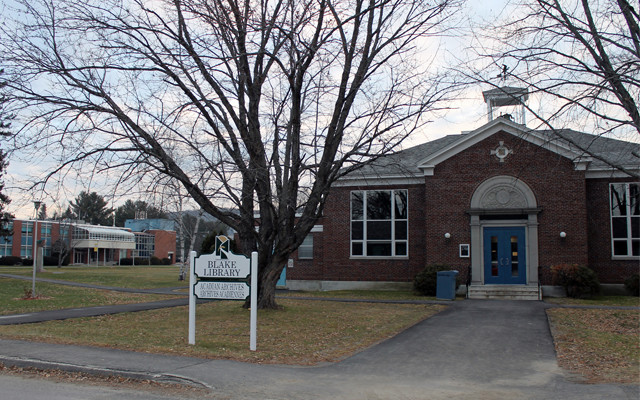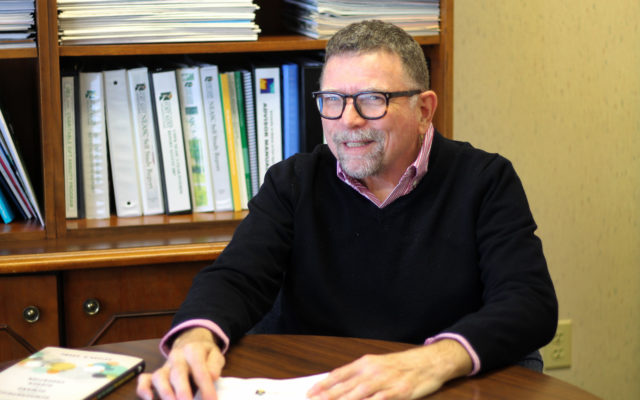FORT KENT, Maine — University of Maine at Fort Kent President John N. Short spoke to a gathering of campus staff and faculty recently to review the current challenges and opportunities the small campus will face in the near future.
“Change frightens people,” Short said Tuesday. “People are worried about jobs or the campus closing.”
In his Jan. 24 “town hall” discussion with campus employees, Short spoke of staying “ahead of the curve” when it comes to dealing with anticipated changes in demographics, higher education demands and funding.
Those realities may lead some to think the future spells the end of UMFK, the northernmost of the seven University of Maine System campuses. Such talk of merging the campus with another, shrinking it or even closing it have been part of UMFK’s history starting in the 1950s and lasting even into this decade.
Short, however, said emphatically on Tuesday that there are no plans to close the Fort Kent campus or merge it with the University of Maine at Presque Isle.
“I love UMFK. It is a fantastic institution,” said Short. “There is no merger or closing. We must maintain two campuses. Each has a unique and historic mission.”
While the two campuses continue to look for opportunities to collaborate to “best leverage resources” and meet workforce development needs and higher education demands, UMS Director of Public Affairs Dan Demeritt said Monday via email that no one should worry at this time about campus consolidation or closure.
“While we place a premium on partnership, there are no discussions underway at UMFK, UMPI or at the system level about closing or consolidating campuses,” Demeritt wrote.
Short said nearly 80 UMFK employees attended the recent campus meeting. Some expressed concerns over losing programs or staffing cuts, while others foresaw a more optimistic future for the campus, he said.
Tuesday Short reviewed the same information he presented to campus employees, including data on the projected long- and short-term demographics for high school graduates and their geographic distribution. Those data indicate the number of students attending four-year colleges, which today is about 1,750,000, will peak in 2025 and then decline to 1,600,000, according to Nathan Gawe’s “Demographics and the Demand for Higher Education.”
That nationwide figure, Short pointed out, is even worse for the northeastern and New England states.
“Demographics is not necessarily destiny,” Short said. “But if we don’t do anything it will be. We can’t just sit around and ignore the trends.”
Staying ahead of that curve is vital, Short said, and collaboration will be an important part of that effort.
“Our future is in sharing resources,” the president noted. “We will need to do that to keep some programs alive.”
In August UMFK and UMPI joined forces to continue delivering a teacher education program at each campus. Both have seen a declining number of education students. This fall, more than 120 education majors were expected to take classes through the Presque Isle campus, while Fort Kent was expected to have just 40 education majors.
- University of Maine at Fort Kent President John N. Short’s campus is embarking on several collaborative ventures with other university system campuses. (Don Eno)
“We have to preserve the ability to retain those education students who can stay on the UMFK campus,” Short said.
As currently structured, the teacher education system will now be a degree program offered by UMPI, but will be available totally on the UMFK campus, making use of Fort Kent and Presque Isle faculty via live courses and remote technology.
The University of Maine System recently announced a similar Fort Kent/Presque Isle collaboration in the nursing program.
“Higher education is an essential component of workforce development and the future economic viability of Aroostook County,” UMPI President Ray Rice said Wednesday in an email.
“Because of that, partnerships among the three public higher education institutions in Aroostook County are absolutely essential. It’s absolutely essential that our two institutions collaborate rather than compete,” Rice added.
“We must also embrace what we do well,” Short said. At UMFK, that means core programs such as nursing, forestry, French, behavioral science, business and criminal justice.
“The work the University of Maine at Fort Kent and the University of Maine at Presque Isle are doing together to preserve and extend access to programs like nursing and education are great examples of how the institutions can collaborate within existing resources and with regional partners to better serve our students,” said Demerritt.
UMS trustees mandate such collaboration, both to expand programs and to retain those that are losing students.
“The state system says we have to do it,” Short said. If enrollment and program goals are not met, campus administrators will have to address those shortcomings. “The trustees are harping on this.”
Both Short and Rice attended a UMS board of trustees meeting Monday to discuss collaboration.
Short said he wants to provide employees and the wider community with the information needed to understand and help craft decisions about the future of UMFK.
“My role is to have open communication,” said Short. “I want people to come to me, talk after the meetings, visit my office.”
Short said advocacy for higher education is his primary goal.
“I see it in terms of the absolute necessity of higher education, especially in rural areas,” he said. “It would hurt the county and the state,” to lose places like UMFK.









